#pastor in west papua
Link
A Christian pastor was among ten people murdered by separatist gunmen in Indonesia’s Papua province on July 16, the Christian Post (CP) reports. The West Papua National Liberation Army, or TPNPB, the military wing of Papua’s main separatist group, claimed responsibility for the killings.
0 notes
Text
News from Australia. West Papua church leader 'executed' by Indonesian military
.JAKARTA: Indonesia's military "executed" a church leader in its insurgency-wracked Papua region, the National Human Rights Commission said on Monday, in the latest allegation of a civilian killing by soldiers.A report by the agency, citing witness testimony, alleged pastor Yeremia Zanambani (pictured) was tortured and then shot by deputy army chief Alpius Hasim Madi during an interrogation on Sept 19. He later died of his wounds."The alleged perpetrator of the torture and extrajudicial killing is a military member," Commissioner Choirul Anam said in a statementhttps://www.nst.com.my/.../papua-church-leader-executed...
0 notes
Text
Alan Nafuki: Pastor of ‘Love and devotion’
Alan Nafuki: Pastor of ‘Love and devotion’
The coffin leaving Malasitapu Presbyterian Church for burial
When he is sought after for his signature on a document to help a total stranger, and he pauses to sign the letter without any question as if it were part of the meeting he is addressing, then you know that he is someone special.
Or if someone finds it difficult to convey a message to the Prime Minister and he hears if it and answers,…

View On WordPress
0 notes
Text
Freeport Indonesia provides aid for refugees in Papua's Intan Jaya
Freeport Indonesia provides aid for refugees in Papua’s Intan Jaya
Freeport provides aid for refugees
Timika, Papua (ANTARA) – PT Freeport Indonesia (PTFI) has supplied 5.3 tonnes of staple food for several hundred residents of Intan Jaya district, Papua, who have taken refuge at the Bilogai church following a spurt in violence in the district.
The gold mining company operating in Papua’s Grasberg minerals district handed the relief packages containing items…

View On WordPress
#free west papua#Intan Jaya#Jayapura#Pastor Marthen Kuayo#PT Freeport Indonesia#separatist terrorist
0 notes
Text
West Papua freedom is “our responsibility”
“What I wish to stress is that fighting for freedom (for West Papua) is everyone’s business beginning with chiefs, church leaders, papas and mamas and young people especially since they have so much energy and power to do those things that their parents cannot do”.
Former Cabinet Minister and former politician, Hilda Lini is the sister of the once ‘Father of Independence’ and first ever Prime Minister of the newly born Republic of Vanuatu, Father Walter Lini, who led the country for the first eleven years after a joint colonial period of 74 years of statelessness.
The once outspoken political leader dared to contest political elections with her male counterparts and won fairly years before any thought of ‘reserve seat’.
Hilda Lini was invited to attend the West Papua Day on December 1 on the Sea Front and became one of the very few invited guests to attend.
While all West Papuan leaders as well as local speakers heartily thanked the Government and people of Vanuatu for their steadfast support towards the West Papua Struggle, no cabinet Ministers nor MPs were present in the ceremony.
Her presence was an assurance of the country’s continuing responsibility over West Papua after the hosting of the historic meeting of West Papuan factions in the Malvatumauri National Council of Chiefs Nakamal in 2014.
The Chairman of the Vanuatu Free West Papua Association, Pastor Alain Nafuki said that meeting became the stepping stone to where west Papua is today after the formation of the United Liberation Movement of West Papua following that meeting.
“The Government went ahead to allocate land at Crow’s Nest to host the ULMWP Office”, he said.
Looking back at country’s struggle for freedom, Lini said Vanuatu’s struggle and its Unity Day on November 29 marking the hoisting of the Vanuaaku Pati flag to proclaim the formation of the People’s Provisional Government was similar to West Papua’s December 1 National Day.
“The only difference was that the West Papua people hoisted their own flag in 1961 so they started their struggle earlier than we did ours but we have achieved our freedom while they are still fighting to achieve theirs”, she noted.
“On July 30 of 1980 here at Independence Park, our first ever Prime Minister, Father Walter Lini, made this statement to all invited guests from near far including guests from West Papua saying, ‘Vanuatu has become an Independent Nation today but yet it is not completely free until every country that is fighting for freedom has achieved its freedom and only then will Vanuatu be completely free’.
“This is the biggest responsibility in our hands in Vanuatu today; little children, young people who were born after 1980, those who were born before 1980, papas, mamas, church leaders and chiefs and every one of us – all members of parliament and the Government, altogether we have this responsibility in our hands.
“While we rejoice for our freedom but we must not forget that we are not totally free until our brothers and sisters who are not far from us are totally free.
“This is our responsibility that is ahead of us and we must get involved to enable West Papua to be free, Kanaky and Tahiti and Wallis and Futuna must be free, while we stayed with East Timor (Timor Leste) until it achieved its freedom. The others are not yet free.
“My message to us the mamas is for us to stand firm at all times because in all situations, we have proved ourselves that we are capable so with all our people, let us stand in solidarity with West Papua until it achieves its independence.
Source: Vanuatu Daily Post
Tweet
from WordPress https://ift.tt/2OYw3RP
via IFTTT
3 notes
·
View notes
Text
Bukti Sejarah Perkembangan dan Pembangunan yang dilakukan Oleh Misionaris Katolik yang kini menjadi Kab. Keerom Prop. Papua
CUKUP LAMA.
HAMPIR 1 ABAD ( 83 Tahun ) UMAT KATOLIK DEKENAT KEEROM MENANTIKAN.
Akhirnya hari ini membuahkan hasil pertama Putra Asli Keerom menjadi Imam Katolik hasil didikan Missionaris dimasa lalu tidak sia sia.
Sejak Pastor Yucundinus Frankenmolen OFM menginjakkan kakinya di Bumi Keerom tepatnya di Arso pada tanggal 22 Mei 1939 maka hari ini sudah 83 Tahun.
Sungguh waktu yang cukup lama hampir 1 Abad, rasa terharu, rasa damai dan gembira, rasa persaudaraan, rasa harmoni disetiap benak umat Katolik Wilayah Keerom hari ini, Terima kasih Tuhan Yesus hari ini sangat dasyat dan spesial karena Anak Murid kami di Wilayah Suku Emem, Suku Draa dan Suku Towe di Paroki Tua Bunda Allah Amgotro Yuruf Anak Kami SOTERUS PANGGUEM OSA di Tabhis menjadi Imam Pertama dan Imam Pembuka jalan selanjutnya setelah penantian yang tak pasti selama 83 Tahun.
Saya masih ingat kata kata terakhir Uskup Herman Munninghoof OFM saat perpisahan bulan April Tahun 2005 di Gereja Katedral Dok V Jayapura.
Kata kata terakhir dalam sambutan Alm Mgr H. Munninghoof saat itu demikian : Hari ini saya berpamitan dengan Masyarakat Papua lebih khusus umat Katolik yang tersebar di rawa rawa, dialirkan sungai, di Pulau terpencil, di pedalaman, dilembah lembah, dilereng lereng yang terjal bahkan sampai di Pegunungan tinggi, saya sudah 52 Tahun berkarya di Tanah Papua dan Tahun ini saya akan pulang terus ke Negri leluhur ku, ke Negri kincir Angin, ke dataran Benua Biru Eropa persisnya di Panti Jompo Fransiskan di Belanda.
Hari ini dalam hatiku tidak tenang, ada rasa menyesal campur kecewa karena di Daerah yang saya mengabdi cukup lama yaitu di Mimika dan Keerom belum menghasilkan tenaga Imam khusus anak asli ( Putra Daerah setempat ). Namun demikian saya yakin dan percaya bahwa ini bukan kutukan, bukan juga ditakdirkan oleh Tuhan sendiri tetapi saya mendoakan terus supaya dalam waktu yang tidak terlalu lama pasti akan berhasil. Memang benar adanya perkataan mantan Uskup tersebut karena saat itu Anak Asli Kamoro Mimika Pastor Yosep Ikikitaro sudah menjadi Imam dan Putra Asli Keerom hari ini bisa di Tabhis menjadi Imam, maka terbukalah tabir yang selama ini menjadi penghalang dan Mgr Herman Munninghoof sedang tersenyum di Firdaus sana tanda hatinya lega dan Terima kasih.
Pastor SOTERUS PANGGUEM OSA berasal dari Paroki Bunda Allah Amgotro Yuruf.
Paroki Bunda Allah termasuk salah satu Paroki Tua di Tanah Papua.
Pada Tanggal 6 Juli 1952 Pastor Arie Blokdjik OFM tiba di Amgotro dari Waris untuk menetap disitu dan keesokan harinya mulai membangun Rumah Pastoran dan Gereja darurat beratapkan daun sagu, awal Tahun 1953 Gereja, rumah sakit dan Gedung sekolah sudah bisa digunakan. Tahun 1953 itu juga beberapa Dusun disekitarnya sudah mulai dibuka menjadi perkampungan yaitu : Kemberatoro, Koinggrobu, dan Akarinda dan sekaligus menempatkan guru guru Katakis yang didatangkan dari Arso dan Waris.
Pastor Jucundinus Frankenmolen berangkat dari Hollandia Binnen tanggal 21 Mei 1939 menuju ke Arso, tidur di Bivak pinggiran Kali Kabur Skanto dan besok pagi tanggal 22 berangkat lagi dan tiba di Arso pada pukul 04 sore. Besoknya tanggal 23 Mei 1939 merupakan hari bersejarah untuk Wilayah Keerom karena hari itu Pastor merayakan Misa Kudus untuk pertama kali di Tanah Keerom West Nieuw Guinea saat itu, selesai Perayaan Ekaristi Pastor buka pakaian misa dan juru Bahasa Tegassa Wuryagir Brotian membawa uang yang dikumpulkan oleh seluruh Masyarakat untuk menyerahkan kepada Pastor agar bisa mengurus guru untuk datang mengajar anak anak di Arso.
Sore harinya tanggal 23 Mei 1939 itu juga Pastor mengunjungi di Kampung Workwana dan besoknya tanggal 24 Mei ke Kampung Kwimi.
Uang yang diserahkan oleh Korano Takasse Wuryagir Brotian itu Pastor gunakan untuk mengurus guru di Fak Fak akhirnya pada tanggal 20 Maret 1940 Bapa Oktovianus Suarubun tiba di Arso untuk membuka Sekolah Missi pertama di Tanah Keerom......!!!!!
Ini sekedar catatan singkat. Bila ada uluran tangan dari Pemda Kabupaten Keerom maka kami siap terbitkan buku sejarah Karya Missionaris Katolik di Bumi Keerom......Semogaaaaaa...!!!!!!?????
Editor Pak Eman Petege
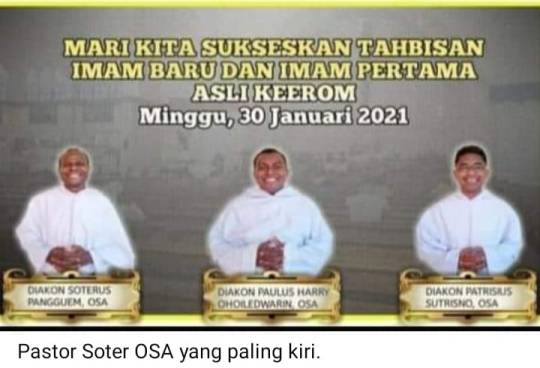

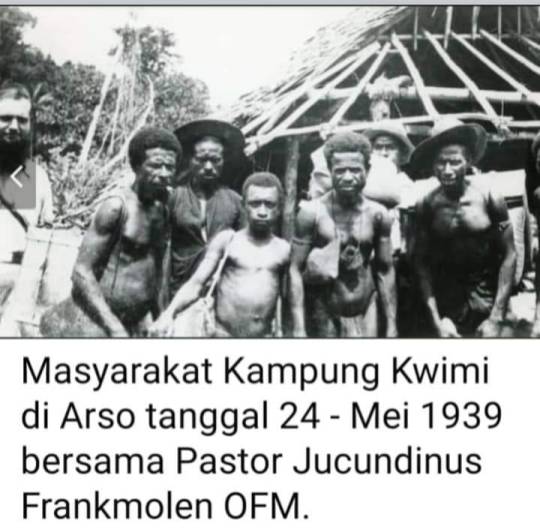
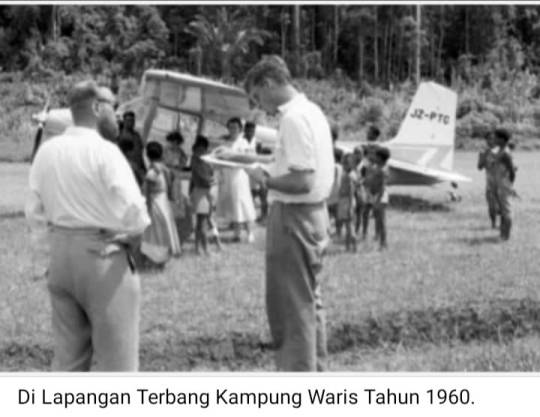


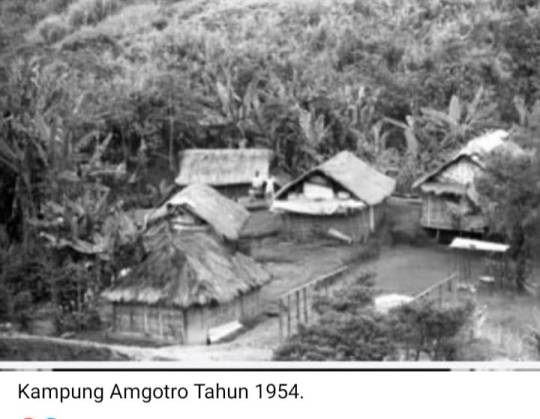
0 notes
Photo

The US can no longer turn a blind eye to abuses in Papua | Human Rights News
On October 28, US Secretary of State Mike Pompeo visited Indonesia as part of a five-country tour of Asia focused on strengthening ties amid ongoing tensions with China. A day after his arrival, an independent humanitarian team, consisting of several religious leaders, academics, and humanitarian activists in Papua, announced that it had found evidence that Yeremia Zanambani, a pastor in the region of Intan Jaya, Papua, had been allegedly shot, stabbed and ultimately killed by an Indonesian soldier. On November 2, Indonesia’s National Human Rights Commission further said that the soldier had allegedly tortured Pastor Yeremia in an attempt to extract information about an armed criminal group in the area.
Two days before Pompeo’s visit, military forces allegedly shot and killed Rufinus Tigau, a catechist working at a Catholic parish in the same region, saying that he was a member of an armed criminal group, a claim the local Catholic diocese denies.
These incidents are just the latest in a series of unlawful killings allegedly involving Indonesian military and police personnel in the provinces of Papua and West Papua.
There has been an Indonesian military presence in Papua since it was incorporated into the country in 1969 after a contentious referendum organised by the United Nations. Under former President Soeharto’s New Order regime (1966-1998), the region was designated as a military operation zone and military forces deployed there were accused of numerous human rights violations.
The designation was lifted shortly after Soeharto’s resignation in 1998, but the military presence has continued and successive governments have adopted a “security approach” to Papua – focusing on the threat posed by armed separatist groups while largely ignoring legitimate socioeconomic and political grievances from the civilian population.
Amnesty has recorded at least 52 cases of suspected unlawful killings by security forces in Papua between February 2018 and November 2020 alone, in which 103 people were killed.
In one such incident in July, 40-year-old Elias Karunggu and his 18-year-old son Sela were shot by Indonesian soldiers in Nduga regency while they were fording a river on the way to the nearest town. The father and son had lived in a forest refugee camp for nearly two years after being displaced from their homes due to ongoing military operations in the area.
Indonesia’s government and military have often sought to portray those killed as armed rebels, or, in certain cases, claim that it was armed rebels that were doing the killing. Official investigations into the killings have been few and far between.
Pompeo’s Jakarta trip came less than two weeks after Indonesian Minister of Defence Prabowo Subianto travelled to Washington for his first official visit after being banned from entering the US for two decades over his involvement as a high-ranking officer in human rights violations. In the 1990s, the US government also imposed military assistance restrictions on the Indonesian military and Kopassus, its army special forces unit where Prabowo was a commander, due to their alleged involvement in war crimes in the East Timor conflict. Kopassus has also been implicated in the kidnapping and murder of Papuan activist Theys Eluay in 2001.
In a statement issued after Prabowo met with US Secretary of Defense Mark Esper, the Department of Defense said: “Both leaders shared their desire to enhance bilateral military-to-military activities and work together on maritime security.”
The statement also said that Esper “communicated the importance of upholding human rights, the rule of law and professionalization as the two countries expand their engagement”. These admirable words might have carried more weight had they not been addressed to a man discharged from the Indonesian military for his involvement in the kidnapping of pro-democracy activists.
Esper’s meeting with Prabowo was another example of something the US has done too often in its relations with Indonesia: paying lip service to human rights while turning a blind eye to flagrant and continuous abuses, particularly in Papua, in order to gain Jakarta’s loyalties in the growing regional competition with China.
Of course, nothing more could have been expected from the current US administration led by a man who had casually tweeted out “when the looting starts, the shooting starts” during mass protests against racism and lavished praise on autocrats and dictators while purportedly serving as the leader of the free world. President Donald Trump has never demonstrated interest in upholding human rights in his own country, let alone addressing human rights violations and abuses elsewhere.
His successor, however, has promised change. “We lead not by the example of our power, but by the power of our example […] With a love of country – and a thirst for justice – let us be the nation that we know we can be,” President-elect Joe Biden said in his election victory speech on November 7.
Such a nation should not put weapons into the hands of foreign soldiers who will use them against civilians and activists. Such a nation should not stay silent when an ally deploys an increasing number of security forces to a region where military and police officers have been implicated in numerous crimes against the local population.
It is high time that the US lead by the power of its example by speaking out against flagrant human rights violations, including in Papua and West Papua, and guaranteeing that no military aid will be used to prolong the suffering of the Papuan people.
The views expressed in this article are the authors’ own and do not necessarily reflect Al Jazeera’s editorial stance.
#humanrights Read full article: https://expatimes.com/?p=15712&feed_id=23608 #asiapacific #humanrights #indonesia #opinions
0 notes
Text
Pastor in West Papua Murdered Amid Regional Tensions
09/22/2020 Indonesia (International Christian Concern) – On September 19, unknown assailants shot and killed Pastor Jeremiah Zanambani at his farm in Intan Jaya, Papua. Pastor Zanambani was known across Indonesia for his servant’s heart and translating the Bible into Papua’s Moni dialect. After Pastor Zanambani was killed, the Indonesian military blamed a ‘rebel’ armed separatist group, known as the KKSB. However, the Indonesian Gospel Tabernacle Church (GKII), Pastor Zanambani’s congregation, d
Go to the article
0 notes
Text
Peter Youngren
Peter Youngren received the call to World Evangelism at the age of fifteen. Still a teenager he began preaching in small chapels and mission houses. Then in 1973, at Bible College in the USA, God spoke to him in a five-hour vision in a chapel service. While tears streamed down his face he saw the outline of the continents of the world appear one by one as on a map. There were no rivers, mountains or fields in the map. Each continent appeared with wall-to-wall people. Their faces were sad, desperate and hopeless, without God and without hope. Then those same continents appeared again. A wind of the Holy Spirit swept over each one. The people’s faces turned before him to joy - radiant joy. The vision was repeated several times. The sense of God’s holiness was powerful. Peter kept whispering, “God you are holy, thank you for cleansing me with your fire.”

Peter took hold of the vision and began to live and act with the urgency of GOSPEL ADVANCEMENT gripping his heart and mind. Jesus words in Matthew 24:14 propelled him forward to conduct unprecedented evangelistic efforts on every continent.
In 1976 Peter founded World Impact Ministries, and has since conducted Gospel Festivals that have drawn up to 600,000 people in one service. Millions have received Jesus and follow up material. Hundreds of thousands of pastors have received training through the Seminars, and have taken what they receive back to their churches.
As founder of World Impact Ministries, Celebration Bible College, Way of Peace and the Celebration Churches in Toronto, Hamilton and Niagara, Canada, Peter is committed to equipping believers to fulfill their purpose before the return of Jesus Christ.
The following is the 10 Point Plan for Global Gospel Advancement that God has put on Peter Youngren’s heart to accomplish.
1. Friendship Festivals:
Huge soul-winning campaigns held throughout the world, with a strong focus on nations and people groups that are “unreached”. Crowds of 50,000 to 600,000 people regularly gather in a single service.
2. Pastors & Leaders Seminars:
Seminars for pastors and church leaders run concurrent with each Friendship Festival. The focus is on training pastors and leaders to advance the Gospel in their own region.
3. Television/Media:
“Celebrating Life with Jesus” is seen daily on television and internet web sites throughout the world. The Good News is spread through media to an ever increasing audience.
4. Follow Up For New Believers:
“Salvation - God’s Gift to You” has been distributed to over 12 million new believers in multiple languages. Other follow up efforts include follow up meetings among locally organized churches.
5. Bible Schools:
Celebration Bible College (formerly World Impact Bible Institute) was established in 1988. To date, more than 3,000 students from over 30 nations have been trained to advance the Gospel. Campuses are located in North America, West Africa, East Africa, India and Asia.
6. Literature & Resources Distribution:
Peter Youngren is the author of over 20 books and study manuals that have been translated into numerous languages.
7. Missionaries:
The commissioning of full-time, overseas field missionaries takes place on an annual basis. Missionaries have been sent to Kenya, Indonesia, Gambia, Thailand, Papua New Guinea, Ethiopia, Croatia, Democratic Republic of Congo, Philippines and Guatemala.
8. Prayer Center:
Prayer is an integral part of every ministry aspect. Thousands of prayer requests are received weekly via the phone, mail and email from every continent.
9. Humanitarian Effort:
Destitute orphans, who would otherwise be without hope, receive support and tender loving care at orphanages sponsored by World Impact Ministries.
This support includes education, food and housing.
10. Personal Ministry to Partners:
Peter Youngren has a strong covenant commitment to his partners. He has carefully instructed all staff about God’s blessing upon partners who participate in the Great Commission. Strategically placed offices in North America, Europe, Africa and Asia minister to partners through literature, videos and prayer.
44 notes
·
View notes
Photo

Perubahan terjadi besar-besaran di planet bumi yang kita huni saat ini. Generasi kami di abad 21 yang dapat menyaksikan, ada yang hanya menonton saja dan mereka yang lainnya tidak hanya tinggal diam dan nonton. Mereka ada yang berkesempatan untuk merenungkan, mencatat dan juga menjadi relawan untuk dapat memutuskan rantai perkembangan wabah ganas kecil yang merubah raksasa-raksasa lainnya di dunia ini. ... Sayapun teringat kembali salah satu ucapan awal seorang pastor Alm. Neles Tebay. Pada tahun 2017. Alm. Tebay diundang menjadi dosen penguji tamu lulusan mahasiswa doktor (Bernadus Renwarin) yang studi di Universitas Kristen Satya Wacana (UKSW), di program doktor studi pembangunan. Saat tiba giliran untuk beliau, kata-kata pertama yang ia sampaikan didepan banyak peserta dan guru-guru besar, mengenai satu ucapan khas orang Papua gunung yaitu kata "Waaa! Waaa! Waaa! Waaa!". Menurut saya Inilah kata yang lebih dan cukup untuk kita kenali sebenarnya dari diri kita itu siapa dan mengapa kita harus ada di dunia ini. Saya sempat merinding dan air mata saya keluar begitu saja dengan sendirinya saat saya mendengarkan penjelasan lanjut dari kata waa! Waa! Waa! Ini dari meja terhormat yang kala itu alm. duduk sejajar bersama para guru besar lainnya.... Silahkan klik link dibawah ini untuk membaca artikel lebih lanjut 👇🏾! https://m.facebook.com/story.php?story_fbid=2867953216583586&id=897780210267573 Sumber gambar: Seniman Italia menggambar tanggan manusia minta pertolongan kepada Tuhan. #VirusCorona #COVID-19 #Corona #Coronavirus #GASPERTABUNI #RezaAAWattimena #JikwanakYK #NelesTebayPr #GuineaWeneNdugure #Melanesia #WestPapua #Papua #China #DuniPertama #UnitedNationOfBalim #UNB #Balim #IndigenousPeoples #BalimFilosofis #BalimCulture #Wamena #Agamua #Penonggalo #PenonggaloPyramid #Wumbakbiri #KurumbiWone #KunumeWene #KunumeWone #SavePapua #SaveBalim #MataHatiBalim ©KunumeWene.2020. (di Kunume Penonggalo Pyramid Balim West Papua Center) https://www.instagram.com/p/B-8UQtYgLuF/?igshid=avqslp113kir
#viruscorona#covid#corona#coronavirus#gaspertabuni#rezaaawattimena#jikwanakyk#nelestebaypr#guineawenendugure#melanesia#westpapua#papua#china#dunipertama#unitednationofbalim#unb#balim#indigenouspeoples#balimfilosofis#balimculture#wamena#agamua#penonggalo#penonggalopyramid#wumbakbiri#kurumbiwone#kunumewene#kunumewone#savepapua#savebalim
0 notes
Text
Melanesian Icon Pastor Allan Nafuki - Farewell
Melanesian Icon Pastor Allan Nafuki – Farewell
West Papua will miss a brilliant precursor.
United Liberation Movement for West Papua or ULMWP was just an idea driving pan – Melanesian consciousness after MSG Leaders met in Noumea, Kanaky, 2014.
West Papua National Coalition for Liberation or WPNCL opened up. This would cater for another two civil society groups representing pro – independence movement inside West PapuaFederal Negara Papua…

View On WordPress
0 notes
Text
Pastor Nafuki, defender of the rights of West Papuans, has died
Pastor Nafuki, defender of the rights of West Papuans, has died
Leader of Vanuatu’s Christian Council and president of the Vanuatu Free West Papua Association, Pastor Nafuki
Leader of Vanuatu’s Christian Council and president of the Vanuatu Free West Papua Association, Pastor Nafuki campaigned for years for the Indonesia-controlled region of Papua to become independent.
Vanuatu (AsiaNews/Agencies) – Vanuatu is paying tribute to Pastor Allen Nafuki…
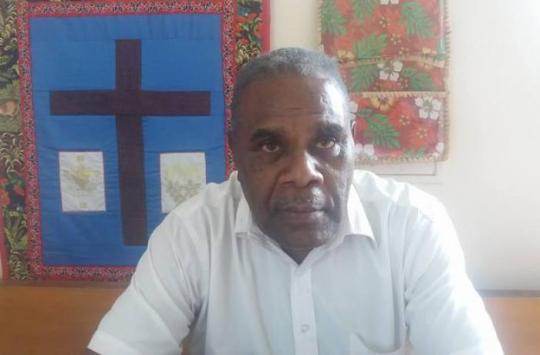
View On WordPress
0 notes
Text
Pelayanan Misionaris Katolik di Papua
Di Kampung Tua Epouto Daerah Wisselmeren Tanggal 14 Januari 1970. Dari hari ini foto 50 Tahun lalu...!!!!
Para Missionaris dan Anak
Anak SD YPPK Epouto gerakan jalan santai dalam rangkah merayakan Ulang Tahun Imamat Pastor Willem Rombouts OFM yang saat itu Tahun 1970 sudah 33 Tahun berkarya melayani di Tanah West Niew Guinea...sejak tiba dari Negri Kincir Angin Belanda 1947.
Dok : Stichting Papua Erfgoed.
Fotografer : Jos Donkers.
Diupload oleh : Eman Petege.

0 notes
Text
Pastor Alan Nafuki berpulang, ucapan duka cita mengalir dari Papua
Pastor Alan Nafuki berpulang, ucapan duka cita mengalir dari Papua
Nabire, Jubi – Direktur Eksekutif United Liberation Movement for West Papua atau ULMWP, Markus Haluk menyampaikan rasa duka citanya atas berpulangnya Pastor Alan Nafuki pada Senin (14/6/2021). Pastor Alan Nafuki adalah Ketua Vanuatu West Papua Unification and Association Committee atau VWPUAC yang selalu konsisten menyuarakan dukungan bagi gerakan Papua merdeka.
“Ia adalah seorang Bapa, Gembala,…

View On WordPress
0 notes
Link
By FEBRIANA FIRDAUS
12 JANUARY 2021 • JAYAPURA, INDONESIA
When Assa Aso, 31, woke up on the morning of December 1, he went straight to the common area of the student dormitory in the Waena district of Jayapura, where he has lived for most of the past decade. Aso is a photographer, a filmmaker, and an activist for the National Committee for West Papua (KNPB), a group that campaigns for the independence of the province on the western fringe of the Indonesian archipelago. Aso and his friends greeted one another — “Happy Independence Day!” — and played music by a band called Mambesak, whose “Nyanyian Sunyi” (“The Silent Song”) has become an anthem of the Papuan independence movement since its lead singer, Arnold Ap, was shot dead while in the custody of Indonesian special forces in 1984.
On December 1, supporters of independence normally hold demonstrations, waving the Morning Star flag of Papua — a criminal offense punishable by up to 15 years in jail. These demonstrations often lead to mass arrests, and sometimes they lead to deaths. The spectacle is meant for a wider audience. To commemorate the day, organizations like KNPB pump out images and videos on social media, encouraging supporters of the cause around the world to draw attention to the ongoing struggle by posting their own pictures and messages of solidarity. When crackdowns happen, they are on the ground to collect evidence that can be broadcast to a global audience to challenge the official accounts provided by the police and the military, which are often uncritically reproduced in the mainstream press.
“We have studied digital movements,” Aso said. “We realize that it’s not enough to encourage people to join the protest but also to let people outside know what we are doing, and then they feel involved. … When the news spreads to the international community, we feel satisfied.”
But just as the government has been able to crack down on supporters of independence on the streets, it has also brought its repression into digital spaces, trying to prevent activists and journalists from documenting and distributing evidence of human rights abuses. In September 2019, Aso was arrested alongside a dozen others for encouraging activists to share images of students shot by police during a protest. He served a total of 10 months in jail for inciting unrest and was released in August. As well as arrest and intimidation, Papua’s pro-independence activists have to contend with sophisticated disinformation campaigns and coordinated attacks by troll farms. And when they most need the international community to see what is happening in West Papua, the Indonesian government deploys a tactic now commonly used by authoritarian regimes — it turns off the internet entirely.
The KNPB is the largest indigenous youth movement in West Papua and among the best organized, with a membership of several hundred thousand, according to its leaders. Founded in 2008, it focuses on nonviolent protests in support of independence. For the past decade, it has also been one of Papua’s most influential voices on social media, using Facebook and Instagram to keep the movement in the public eye.
In 2016, the group used Facebook to bring thousands of people to a protest that almost shut down the city of Jayapura.
The KNPB has created a sophisticated network for gathering and disseminating information. Some members work on the road, collecting imagery and videos and reporting on events. They send their material back to colleagues who turn it into stories and social posts, which are then translated into Bahasa Indonesia and English and shared with other members via a Facebook Messenger group. These are then distributed more widely on Facebook, where the group’s members and supporters try to maximize their reach.
The group has learned to adapt its messaging so that it resonates with global audiences. After the Black Lives Matter movement made international headlines in May, the KNPB and other sympathetic organizations began to use the hashtag #PapuanLivesMatter, drawing parallels between racism and police violence in the U.S. and the routine discrimination and aggression faced by Papuans in Indonesia. In June, the hashtag trended in several countries and was reported on by outlets in the U.K., U.S., and Australia, where some BLM marchers displayed Morning Star flags in solidarity.
Websites, including those run by the Free West Papua pressure group, led by the exiled political leader Benny Wenda, have been blocked since 2016 for supporting separatism. Independent news sites, including Suara Papua, a local outlet, have been periodically blocked, most recently after a surge in protests in 2019.
Other sites, including that of Tabloid Jubi, a leading newspaper in the region, have been targeted by distributed denial of service (DDOS) attacks, which flood servers with access requests, causing them to overload. In October 2019, these attacks finally brought Tabloid Jubi’s site down entirely; according to Victor Mambor, the paper’s founder, it had to be rebuilt. “Now we use dedicated secure hosting from overseas,” he told Rest of World.
As well as censoring opposing viewpoints, the Indonesian authorities have run disinformation operations online. In January 2020, Reuters reporters found that a number of sites purporting to be independent news outlets and parroting official versions of events, had been established by an Indonesian Army soldier, some of which were registered to the army’s regional command center in Jakarta.
Pro-government trolls have attacked supporters of Papuan independence. When the prime minister of Vanuatu raised concerns about human rights abuses in West Papua at the United Nations in September 2020, Indonesian users — many believed to be bots — trolled the official Instagram account of the South Pacific Ocean nation with racist comments. The Vanuatu Tourism Office, which ran the account, said in a statement that it believes the comments to have been a “coordinated inauthentic [social media] activity.”
On the morning of August 28, 2019, a crowd of people gathered in front of the government offices in West Papua’s Deiyai Regency to perform the Waita, a traditional war dance that involves moving in circles, mimicking the sound of birds, and carrying bows and arrows. Santon Tekege, a 34-year-old pastor, was among them, having driven the half hour to Deiyai from his church in the village of Enarotali in the neighboring Paniai Regency, to join what was supposed to be a peaceful rally against racism.
Protests had begun nearly two weeks before, after Papuan students living in Surabaya, a city on the Indonesian island of Java — where the capital, Jakarta, is located — were racially abused by nationalist vigilantes. When the students demonstrated against their treatment, the police responded with tear gas. Videos of the incident spread on social media, sparking huge rallies in Papua, some of which turned violent. Protesters blocked roads; others burned public buildings.
On August 28, according to Tekege, the activists’ intention was to hold a peaceful rally at the regent’s office while a meeting of high-level government, police, and military officials went on inside, but it descended into bloody chaos. First, police fired tear gas and live rounds to try to disperse the protesters. Then, at around 2 p.m., a car driven by a man in military uniform crashed into the crowd, killing a 17-year-old boy. One protestor fired a bow and arrow, killing the car’s driver. The vehicle’s four passengers, also wearing fatigues, rushed out and began shooting their rifles into the demonstration. Eight protesters were killed.
Tekege, who had been near the front of the crowd, fled, heading for the jungle that surrounds Deiyai, along with others from his village. “I was crying,” he said. “I saw people being killed. I hid in the trees.” From the relative safety of the forest, he and other villagers began to document the event. Using their cell phones, they took photos and videos of those who had been injured as they waited to get a ride back to Enarotali. Many stayed in the forest for days or weeks, too afraid to go home, Tekege said.
Back in Deiyai, activists and journalists were struggling to get word out about the massacre. Since the protests began, the government had used “bandwidth throttling” — slowing down the internet — and periodic blackouts to limit protesters’ ability to organize and prevent information leaking out. A week earlier, on August 21, the internet across the province had been all but shut down, and cell phone networks heavily restricted.
Some groups had to resort to extreme measures. Sebby Sambom, a spokesperson for the West Papua Liberation National Army, a rebel group, said its members smuggled information out across the border between West Papua and Papua New Guinea. He wouldn’t reveal the specifics of the route, saying only that the organization’s members went by road, by sea, and through the forests. “We were working hard, day and night, to send the photos,” he said.
However, in Jayapura, activists and journalists found connections that were still working at luxury hotels whose owners had paid for satellite internet service.
“There were two hotels, Grand ABE and Yasmin, which provided internet using satellite-based VSAT IP,” said Angela Flassy, chief editor of Tabloid Jubi. “We just had to buy the package there, but it was more expensive from the regular provider.” The paper’s journalists in the field filed their copy via SMS messages to a newsroom set up in the hotel, where editors could send the stories to their colleagues in Java to publish on the website.
There were some public access points to the internet too. Since in 2013, the Ministry of Communications and Informatics has been installing “hot spots” — internet stations in schools and churches — in remote areas of the Indonesian archipelago where the private sector has no commercial incentive to reach, such as Kalimantan, on the island of Borneo; East Nusa Tenggara, which borders Timor Leste; and West Papua. In February 2019, the government rented a satellite from a private company, Pasifik Satelit Nusantara, to connect some of these hot spots to the internet.
Using the hot spot in Enarotali, in the following days, Tekege and other villagers were able to send the photos and videos they had taken to journalists and activists, including the exiled Indonesian human rights lawyer Veronica Koman; Abeth You, a Tabloid Jubi reporter who was in Jayapura; and the chief editor of Suara Papua, Arnold Belau.
The images that Tekege and the others sent of bodies and wounds contradicted the Indonesian government’s official line that news of the shootings was a hoax and showed that security forces had violently dispersed the protesters. The military later admitted that the shootings had happened, although they maintain that only two Papuans, along with one soldier, died.
Telkomsel internet access was restored fully in West Papua on September 11, 2019.
In January 2020, the Alliance of Independent Journalists (AJI), SAFEnet, and the Indonesian Legal Aid Foundation (YLBHI), among other groups, filed a lawsuit against the government, claiming that the internet blackout was illegal. In June, the Jakarta State Administrative Court agreed. However, no one was punished, and the government merely had to pay the trial costs.
About two weeks after Tekege used the Enarotali hot spot to contact journalists, it was shut down.
When Rest of World asked Latif, from BAKTI, about the hot spots, he denied that the ministry had switched off the signal. You, the reporter for Tabloid Jubi, said that the hot spot was completely inoperable when he was in Deiyai on December 1 last year. Jery A. Yudianto, the head of the Papua Province Communication and Information Office, the Ministry of Communications’ regional branch, said his department is aware that the hot spot is out of service but has not been able to fix it. “It’s under Jakarta’s control,” he said.
(selected segments of the article)
1 note
·
View note